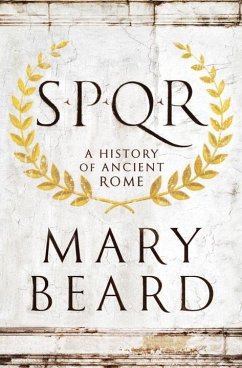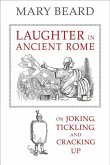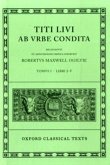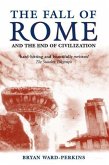Ancient Rome was an imposing city even by modern standards, a sprawling imperial metropolis of more than a million inhabitants, a "mixture of luxury and filth, liberty and exploitation, civic pride and murderous civil war" that served as the seat of power for an empire that spanned from Spain to Syria. Yet how did all this emerge from what was once an insignificant village in central Italy? In S.P.Q.R., world-renowned classicist Mary Beard narrates the unprecedented rise of a civilization that even two thousand years later still shapes many of our most fundamental assumptions about power, citizenship, responsibility, political violence, empire, luxury, and beauty. From the foundational myth of Romulus and Remus to 212 ce-nearly a thousand years later-when the emperor Caracalla gave Roman citizenship to every free inhabitant of the empire, S.P.Q.R. (the abbreviation of "The Senate and People of Rome") examines not just how we think of ancient Rome but challenges the comfortable historical perspectives that have existed for centuries by exploring how the Romans thought of themselves: how they challenged the idea of imperial rule, how they responded to terrorism and revolution, and how they invented a new idea of citizenship and nation. Opening the book in 63 bce with the famous clash between the populist aristocrat Catiline and Cicero, the renowned politician and orator, Beard animates this "terrorist conspiracy," which was aimed at the very heart of the Republic, demonstrating how this singular event would presage the struggle between democracy and autocracy that would come to define much of Rome's subsequent history. Illustrating how a classical democracy yielded to a self-confident and self-critical empire, S.P.Q.R. reintroduces us, though in a wholly different way, to famous and familiar characters-Hannibal, Julius Caesar, Cleopatra, Augustus, and Nero, among others-while expanding the historical aperture to include those overlooked in traditional histories: the women, the slaves and ex-slaves, conspirators, and those on the losing side of Rome's glorious conquests. Like the best detectives, Beard sifts fact from fiction, myth and propaganda from historical record, refusing either simple admiration or blanket condemnation. Far from being frozen in marble, Roman history, she shows, is constantly being revised and rewritten as our knowledge expands. Indeed, our perceptions of ancient Rome have changed dramatically over the last fifty years, and S.P.Q.R., with its nuanced attention to class inequality, democratic struggles, and the lives of entire groups of people omitted from the historical narrative for centuries, promises to shape our view of Roman history for decades to come.
Hinweis: Dieser Artikel kann nur an eine deutsche Lieferadresse ausgeliefert werden.
Hinweis: Dieser Artikel kann nur an eine deutsche Lieferadresse ausgeliefert werden.

Selbst wer schon mehr als eine römische Geschichte kennt, sollte diese hier unbedingt lesen: "SPQR. A History of Ancient Rome". Geschrieben hat sie Mary Beard. Die 60-Jährige, die in Cambridge Classics lehrt und für die "Times" bloggt, ist die scharfsinnigste und streitbarste Althistorikerin, die man sich wünschen kann. Da muss nicht der Staub der Archive weggepustet werden; Beard steht mitten in der Gegenwart, wenn sie etwa den Beitrag der Immigranten zur englischen Gesellschaft würdigt und dafür unflätig beschimpft wird. Und sie weiß natürlich genau, wie sich Prozesse der Migration und Integration im Römischen Reich vollzogen, ohne je mit kruden Vergleichen Kurzschlüsse zu produzieren.
Ihr Gestus ist subtiler. Sie perforiert Gewissheiten, indem sie Fragen stellt: Was bedeutet es, dass wir auf die frühe römische Geschichte praktisch nur durch die Augen des ersten Jahrhunderts v. Chr. blicken? Und auf dieses erste Jahrhundert zu großen Teilen durch den Filter von Ciceros Schriften? Es könnte, zum Beispiel, heißen, dass wir in Legenden und mythologischen Erzählungen keine Erkenntnisse über die Anfänge der Republik erwarten, sondern das Selbstbild des ersten Jahrhunderts dechiffrieren. Beards Verfahren zeigt, dass unser Blick sich nicht durch apodiktische Antworten ändert, sondern durch neue Fragen. Oder andere Wege, sich den alten Fragen zu nähern, wie etwa jener, warum aus diesem kleinen Stadtstaat dieses langlebige Weltreich wurde. Beard kennt dabei natürlich auch die Regalmeter Forschungsliteratur, sie schreibt bloß nicht so, als müsse sie einem das ständig demonstrieren. Sie ist mal analytisch, mal anekdotisch und hat auch ihren Spaß an den Sex-and-Crime-Elementen der Kaiserbiographien.
Ihre Leidenschaft für diese fremde, vertraute, ferne Römerwelt ist groß genug, um einen sofort hineinzuziehen. "Ein langes Gespräch mit ihnen", so beschreibt sie ihr Verhältnis zu den Römern; man muss halt zuhören, den Echos in der Gegenwart lauschen. Und überraschend, wie Mary Beard oft ist, lässt sie ihr Buch nicht mit den üblichen Zäsuren enden, sondern im Jahr 212, mit Caracallas Verleihung des Bürgerrechts an jeden frei geborenen Einwohner des Reiches - weil in dem Moment der Unterschied zwischen Eroberern und Eroberten verschwindet. Und man wünscht sich sehr, weil ja bald Weihnachten ist, dass ein deutscher Verlag dieses Buch übersetzt.
Peter Körte
Mary Beard: "SPQR. A History of Ancient Rome". Profile Books, 606 Seiten, 28,99 Euro
Alle Rechte vorbehalten. © F.A.Z. GmbH, Frankfurt am Main








